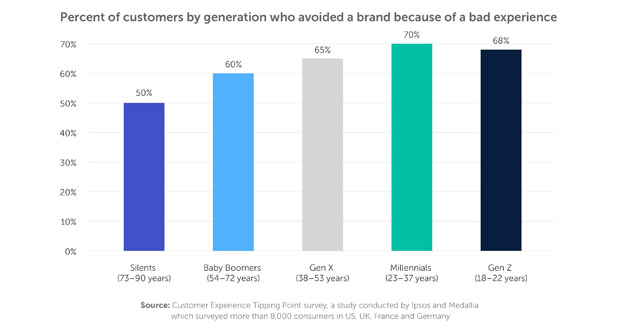
SAN MATEO, Calif.—Medallia, Inc. together with market research company Ipsos recently shared the findings from its Customer Experience Tipping Point survey. More than 8,000 consumers were surveyed across the United States, United Kingdom, France, and Germany. The findings reveal that customer experience is the top reason consumers cite for choosing a particular brand when making a purchase.
The data shows that consumers are quick to both penalize and reward a brand based on their experience. In fact, 77 percent of respondents claim to have chosen a product or service from a company because of good experiences they had with it, while 64 percent of respondents said they have avoided a brand because of a bad experience they had within the last year.
“Consumers today are sophisticated and do their research before making a purchase. They expect to have a seamless and positive experience and if those aren’t met, consumers know they have options,” said Rachel Lane, solution principal at Medallia. “For companies looking to create a competitive edge, having a strong brand recognition, or even stellar product isn’t enough. Customer experience is the tipping point, and without a strong plan to create and maintain a positive experience, businesses will lose out.”
According to the survey, the demand for a positive customer experience is especially high in the United States, and while loyalty is on the decline, expectations are on the rise, particularly among younger groups of consumers. For example, in banking and online retail, 30 percent of Gen Z and 22 percent of Millennials surveyed indicated that their expectations of customer experience are higher today than they were two years ago. The survey shows expectations have risen in the United States across all six industries examined, including hotels, and U.S. respondents reported significantly higher expectations than European consumers for personalized experiences, real-time response, and ability to chat with a live agent.
“Acknowledgement of customer experience as a driver of business performance is at an all-time high. Failure to properly understand customer needs leads to wasted money, time, and energy,” said Jean-Francois Damais, chief research officer at Ipsos. “Ipsos’ extensive research has shown that when it comes to dealing with customer issues, the key is to reduce perceptions of unfairness. That’s all about getting the balance of effort right. It’s a time-critical case of reacting intelligently, being mindful of your customer, and knowing when it’s enough to say sorry. And perhaps more importantly, when it isn’t.”
Below are six other key findings from the report.
A single bad experience can cost a brand a customer. Nearly half (46 percent) of U.S. mobile network customers said they are likely to switch brands after having one bad experience.
Every touchpoint matters. Customers expect their experience to be seamless and efficient on and offline. For instance, 56 percent of online retail shoppers and 49 percent of retail offline shoppers expect consistent levels of service across physical and digital channels.
Customers don’t want to be responsible for fixing a company’s mistake. According to the study, 70 percent of consumers report that they expect an immediate response when they submit a complaint. Further, when customers believe they have put in more effort than a company to resolve an issue, they are twice as likely to tell friends, family, or colleagues about the bad experience, and four times more likely to stop purchasing from the company, switch brands, or use the company less frequently.
Consumers expect a personalized experience. Thirty percent of customers expect call center agents to be instantly familiar with their contact history, and 40 percent, on average, expect to be offered personalized experiences based on their interests, buying behavior, demographics, and psychographics.
Brands may be forgetting an important group of buyers. Many companies tailor to younger generations, but the 55+ age group is the fastest growing adult demographic in the United States. This group of consumers indicated their expectations were exceeded in the last 12 months at a lower rate than any other group surveyed.
Women and younger generations are more likely to avoid a brand because of a bad experience. Sixty-six percent of women (versus 62 percent of men) globally have avoided a brand because of a bad experience, with 64 percent being the global average for both men and women. In addition, this behavior is even more pronounced for millennials and Gen Z, with 70 percent and 68 percent respectively avoiding a brand because of a bad experience.











